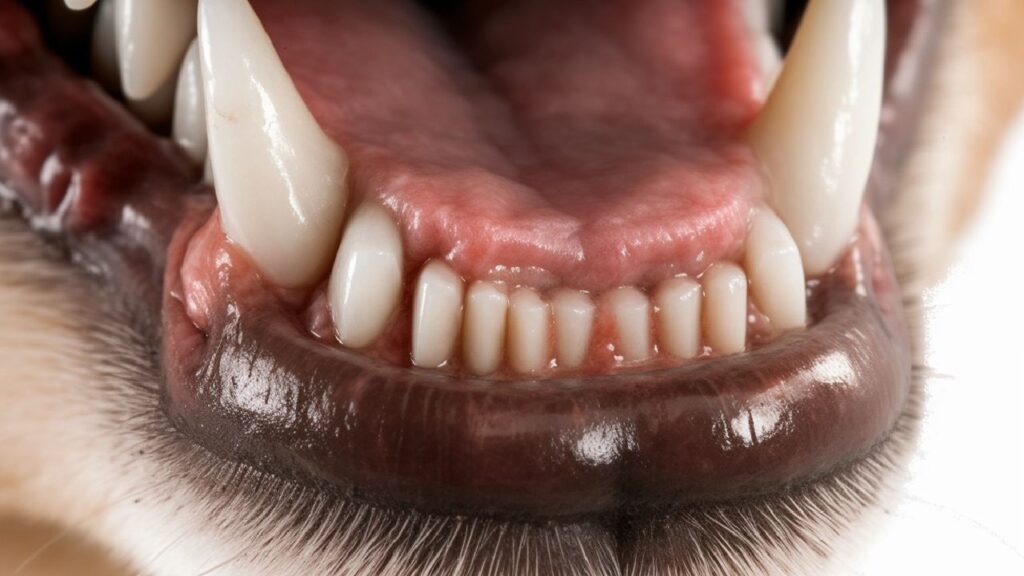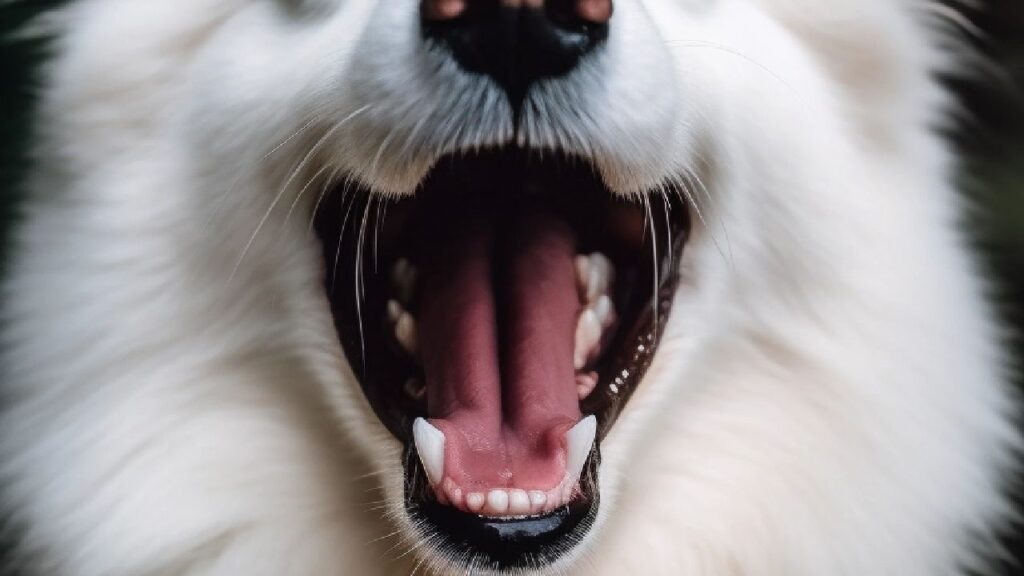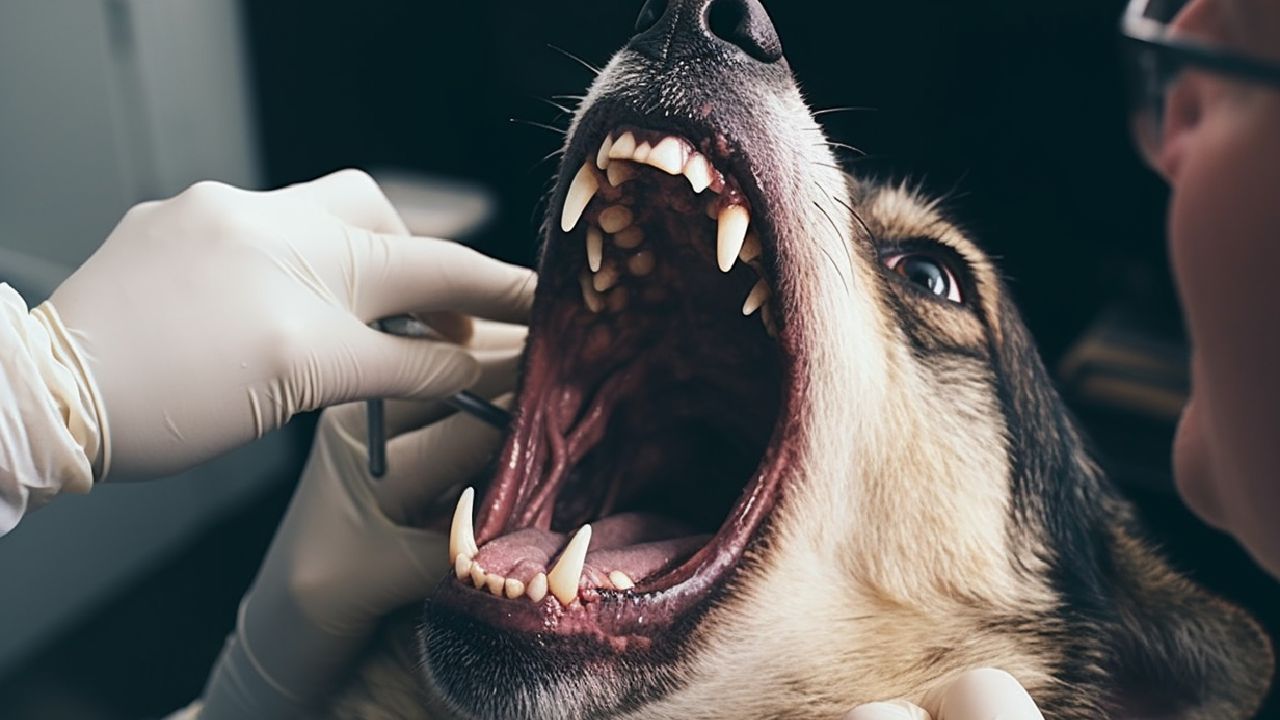Welcome to an exploration of canine dental anatomy, where we delve into the fascinating world of canine teeth. This article will unravel the mysteries surrounding canine teeth, addressing key questions such as “How Many Teeth Do Dogs Have?” and exploring the various teeth types contributing to their unique dental structure.
Join us on this informative journey to gain a deeper understanding of the dental intricacies that play a crucial role in the lives of our canine companions.
How Many Teeth Do Dogs Have?
Dogs typically have 42 teeth, although the number can vary slightly depending on the breed. Puppies start with deciduous or baby teeth, which eventually fall out and are replaced by permanent teeth. Adult dogs generally have 20 upper teeth and 22 lower teeth. These include incisors, canines, premolars, and molars, each serving specific functions in biting, chewing, and grinding food.
Incisors: The Frontline Graspers
You’ll find their incisors at the very front of your dog’s mouth. These small, sharp teeth, often likened to tiny chisels, are designed for grasping and nibbling.
Think of them as your dog’s primary tools for picking up objects and gently taking treats from your hand. Dogs typically have six incisors on the upper jaw and another six on the lower jaw, totaling 12 incisors.
Canines: The Mighty Fangs
Moving slightly inward from the incisors, you’ll encounter the canines. These are the pointy, conspicuous teeth often called “fangs” or “eye teeth.” Canines are built for a more substantial role – tearing and holding onto objects.
When your dog engages in a game of tug-of-war or vigorously dismantles their favorite toy, these teeth do the heavy lifting. Most dogs have four canines in their mouth, two on the upper jaw and two on the lower jaw.
Premolars: The Grinding Machines
The premolars lie further back in the mouth, beyond the canines. These flat-topped, multi-cusped teeth are responsible for grinding and crushing.
They play a pivotal role in processing food efficiently, ensuring that dinner vanishes quickly. Dogs typically have eight premolars on the upper jaw and eight on the lower jaw, making 16 premolars.
Molars: The Heavy-duty Chewers
Last but certainly not least, we find the molars at the mouth’s rear. These are the most prominent and sturdiest teeth in the canine dental arsenal.
With their robust structure, molars are designed for heavy-duty grinding and crushing, making light work of more rigid food items and bones. Dogs usually have ten molars, evenly split, with five on the upper jaw and five on the lower jaw.
Now that you’re well-acquainted with the types of teeth your dog possesses, you might be curious about their early dental developments. Just like humans, puppies start their dental journey with a set of baby teeth.

Milk Teeth – Puppies’ Precious Start
Much like the tender saplings of a young tree, puppies begin life with milk teeth, scientifically known as deciduous teeth.
These little teeth emerge when puppies are around three weeks old and continue growing until they’re approximately six months old. During this crucial phase, your puppy’s baby teeth will eventually fall out, making way for their permanent teeth.
Understanding the transition from milk to permanent teeth is vital for dog owners. It’s common for puppies to experience discomfort during this phase, leading to increased chewing and teething.
Appropriate chew toys and treats are essential to ease their discomfort and keep those tiny teeth healthy. This soothes their sore gums and helps them adapt to the sensation of having teeth.
So, now you know that behind that infectious canine grin, your dog has a complex dental system comprising incisors, canines, premolars, and molars. Taking care of these teeth is a responsibility that extends far beyond just maintaining a dazzling smile.
Why Dog Dental Care Matters
But why is dog dental care so crucial? Is it only about keeping your dog’s breath fresh? Not at all! Proper canine dental care is fundamental to their overall health and well-being. Here are some compelling reasons why you should prioritize your furry friend’s oral health:
- Preventing Dental Disease: Like humans, dogs can develop dental issues such as gum disease, tooth decay, and plaque buildup. Neglecting their dental care can lead to painful infections and costly veterinary bills.
- Better Overall Health: Poor oral health in dogs can have broader consequences. Bacteria from dental issues can enter the bloodstream, potentially causing problems in the heart, liver, and kidneys.
- Longer Lifespan: Caring for your dog’s teeth contributes to their overall health, leading to a longer and happier life. Proper chewing and digestion also improve nutrient absorption.
- Fresh Breath: A healthy mouth means fresher breath. Ensuring your dog’s breath stays pleasant makes your cuddle sessions more enjoyable.

Tips for Canine Dental Care
- Brushing: Yes, dogs can have their toothbrush and toothpaste. There are specialized dog toothbrushes and toothpaste flavors like chicken and beef that can make brushing a more enjoyable experience for your pup. Aim to brush their teeth at least a few times a week.
- Dental Chews: Dental chews and toys that promote oral health can help reduce plaque and tartar buildup. They also serve as a tasty treat for your furry friend.
- Regular Checkups: Schedule regular dental checkups with your veterinarian. They can identify and address any dental issues before they become severe.
- Diet Matters: Feeding your dog high-quality food can also impact their dental health. Some specialized diets and dental kibbles are designed to reduce plaque and tartar.
- Monitor Chewing Habits: Be attentive to what your dog chews. Avoid complex objects like rocks or sticks, which can damage their teeth.
Your dog’s dental health is critical to their overall well-being. Understanding how many teeth dogs have and the functions of each type can help you appreciate their unique dental needs.
From milk to permanent teeth, providing proper care to ensure a happy, healthy life for your furry companion is essential. So, remember to give your pup’s pearly whites the love and attention they deserve, and you’ll be rewarded with countless smiles in return.

FAQs
Why do dogs have both baby teeth and adult teeth?
Dogs, like humans, develop baby teeth (deciduous teeth) first to facilitate nursing. These temporary teeth eventually fall out to make way for more substantial, permanent teeth as they grow.
Can dental problems affect my dog’s behavior?
Yes, dental issues can impact behavior. Painful dental conditions may lead to irritability, changes in eating habits, or even aggression. Regular dental care can help prevent such problems.
How can I naturally freshen my dog’s breath?
You can freshen your dog’s breath by offering dental chews, providing clean water, and adding parsley to their diet. Regular dental care, like brushing, also contributes to fresher breath.
What is dental scaling for dogs, and when is it necessary?
Dental scaling is a professional cleaning procedure that removes plaque and tartar buildup. It’s necessary when at-home care isn’t enough or when your vet identifies dental issues during checkups.
Can I use human toothpaste on my dog’s teeth?
No, human toothpaste is not safe for dogs as it contains ingredients like fluoride, which can be toxic. Use dog-specific toothpaste that is safe for ingestion.
Are there breed-specific dental concerns I should be aware of?
Yes, some breeds are more prone to dental issues due to their jaw structure or genetic factors. Breeds like Bulldogs and Shih Tzus are often at higher risk so extra dental care may be needed.
Can dental health affect my dog’s longevity?
Maintaining good dental health can impact your dog’s lifespan. Dental problems can lead to systemic issues, so addressing oral health can improve your pet’s longer and healthier life.






I had no idea about the number of teeth dogs have! Checked my pup’s mouth, and it’s like a dental mystery in there. How often do you guys brush your dog’s teeth?
Never realized how many teeth dogs have until I read your article!